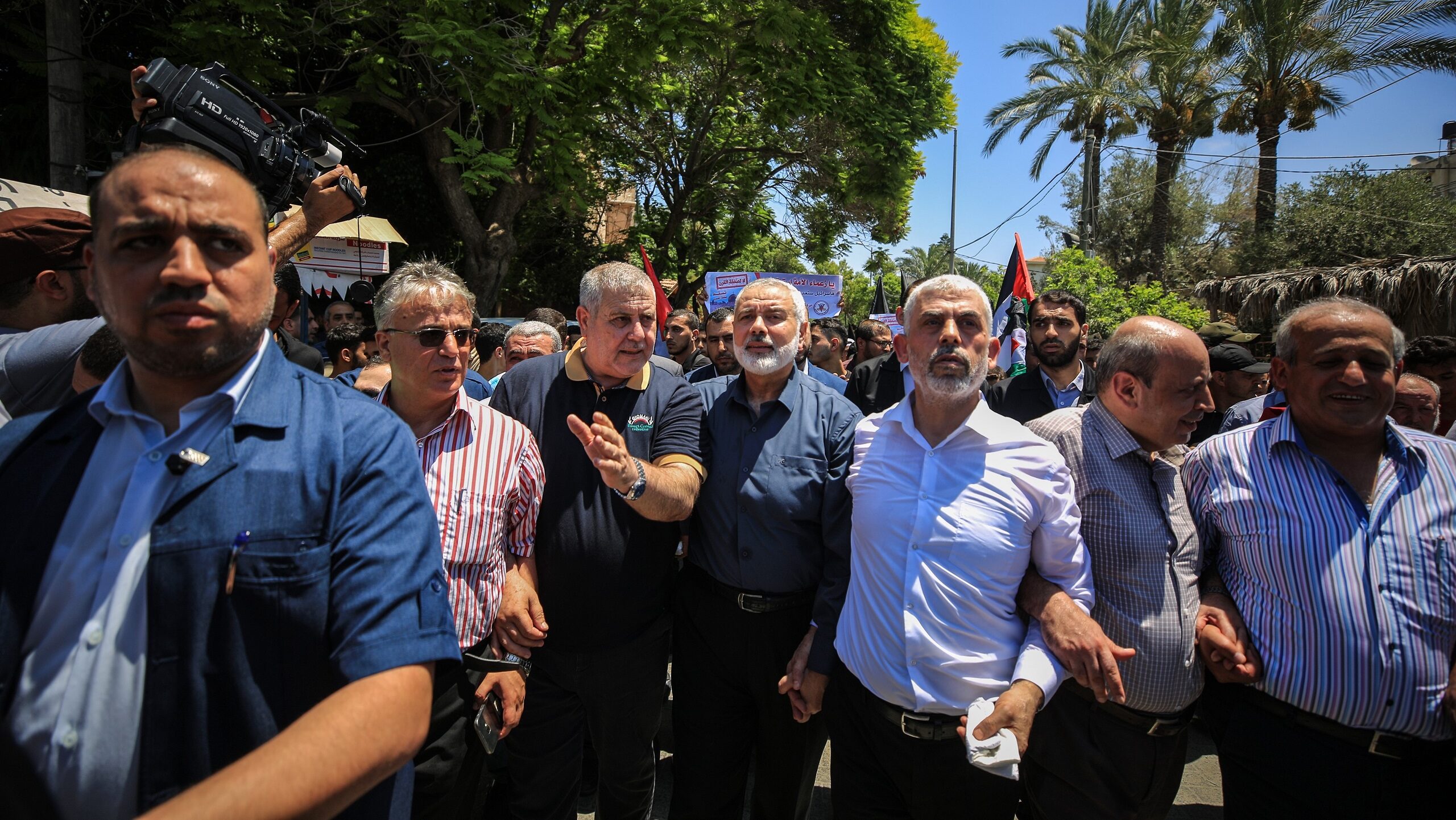Hamas Is No Longer a Homogeneous Faction
The feud between Sinwar and Haniyeh decapitated the movement’s ability to secure its survival the day after the war in Gaza, which unveiled how bitter Iran’s betrayal was for Hamas and Islamic Jihad
It’s unclear who represents Hamas in negotiations to end the war in Gaza, aiming to swap Palestinian prisoners held in Israel for the Israeli captives in Gaza and secure a complete Israeli withdrawal from the Gaza Strip.
The influence of Hamas’ political bureau has reportedly waned in Gaza due to the exile of most of its members. Yahya Sinwar and Mohammed Deif, Hamas’ strongmen in Gaza, reportedly do not follow directives from their leadership in Doha. Both have decided to go rogue and lead a faction within Hamas far from the political leadership and closer to Iran, where financial and military aid is more generous.
Sinwar was close to Haniyeh in the eighties of the last century when both served under Sheikh Ahmad Yassin, Hamas’ spiritual leader and founder. Their paths diverged when Israel arrested Sinwar in 1989 for orchestrating the kidnapping of two Israeli soldiers and the killing of four Palestinians suspected of collaborating with Israel’s Shin Bet security agency. Israeli press reports at the time said Sinwar confessed to his interrogators that he strangled to death two collaborators, killed the third during a ruthless and violent interrogation, and “accidentally” shot the fourth during an attempt to kidnap him for interrogation purposes.
Consequently, Sinwar earned the code name “Butcher of Khan Yunis” due to his role in founding Al Majd, Hamas’ intelligence and security arm. Behind Israeli bars, Sinwar also served as Hamas’ top security man in charge of interrogating those suspected of collaborating with the Prison Authority and Shin Bet. Fellow prisoners, who spent extensive time with Sinwar, confirmed his ruthlessness toward both Israeli occupiers and Palestinian collaborators.
Upon his release in the Gilad Shalit exchange in 2011, Sinwar became a close aide to Haniyeh, then in Gaza. They worked together and helped each other fortify their status among Hamas followers in Gaza. In the February 2017 Hamas internal elections, Sinwar was covertly elected head of Hamas in Gaza, taking over from Ismail Haniyeh, who became head of the political bureau. In the March 2021 elections, Sinwar was again elected head of Hamas in Gaza.
By that time, he had forged strong connections with Iran. He formed an alliance with Qasem Soleimani, commander of the Quds Force in the Islamic Revolutionary Guard Corps. Their ties deepened, with Soleimani generously offering Hamas in Gaza extensive military support and training. No wonder some senior Hamas members termed the October 7 attack on Israel’s southern towns a tribute to Soleimani, who was assassinated by a US drone on January 3, 2020, at Baghdad’s International Airport.
Give the gift of hope
We practice what we preach:
accurate, fearless journalism. But we can't do it alone.
- On the ground in Gaza, Syria, Israel, Egypt, Pakistan, and more
- Our program trained more than 100 journalists
- Calling out fake news and reporting real facts
- On the ground in Gaza, Syria, Israel, Egypt, Pakistan, and more
- Our program trained more than 100 journalists
- Calling out fake news and reporting real facts
Join us.
Support The Media Line. Save democracy.
On Monday, the war in Gaza entered its seventh month. Tensions between Sinwar and Haniyeh escalated as both competed for the position of political bureau chief. Elections are anticipated to occur in early 2026. Neither knows whether the movement will still exist then, or in what form. It’s uncertain if tensions between Sinwar and Haniyeh would be as high had Haniyeh not left Gaza in September 2020. Haniyeh has since lived between Istanbul and Doha, ultimately settling in Doha after Turkey requested that senior Hamas members involved in security missions leave.
Living abroad allowed Haniyeh to present himself to world leaders as Hamas’ new head. This left Sinwar behind in the Gaza Strip, constrained by his responsibilities. His focus remained on internal security for Hamas and the Izz ad-Din al-Qassam Brigades. Suddenly, Sinwar found himself the highest-ranking Hamas official in the Gaza Strip and acted accordingly.
Sinwar saw himself as the Gaza Strip’s self-appointed emperor. He distanced his faction from the political leadership abroad, aligning more closely with Hamas’ local military command. His close relations with Deif, the Qassam Brigades chief of staff, accorded him the power he needed to balance Haniyeh’s and his allies’ influence abroad.
Sinwar further isolated his movement and Gaza from the Palestinian Authority in Ramallah. To prove his point, he established a local committee reporting directly to him to manage daily life in Gaza.
In October 2018, Sinwar effectively won the jackpot when Israel and Qatar agreed that the latter would send monthly financial support to Hamas in Gaza, effectively to Sinwar, facilitated by cooperation with the Israeli Shin Bet. Since then, Sinwar has solidified his rule and overseen the expansion of underground tunnels, which Hamas always claimed were built to prepare for an upcoming confrontation with the “Zionist occupiers.” Following the Israeli invasion of Gaza in January, in retaliation for the October 7 attack, the tunnels sheltered only the Hamas leadership and their families, leaving Palestinian civilians to bear the brunt. As of this writing, over 33,000 Palestinian civilians in Gaza have died. Musa Abu Marzouk, former head of Hamas’ political bureau, provocatively stated on an Arab satellite channel that sheltering civilians in Gaza was UNRWA’s responsibility “because Hamas’ shelters were for Hamas only.”
Longtime Hamas members and supporters are now uncertain whether to remain or leave. They are not happy that their movement failed to protect Gaza’s people from Israel’s attacks. Six months into the war, frustration has grown among them because neither the leadership in Gaza nor abroad has managed to secure a deal with Israel to end their suffering.
For Iran, seeking influential and loyal proxies in the Middle East, Sinwar and Deif represented prime acquisitions. Iran found Hamas’ political leadership, aligned with Turkey and Qatar, unreliable. Tehran sought loyalists fully committed to the ayatollahs’ regime, controllable through financial and military aid.
Iran’s aim to align Palestinians with its cause led to recruiting allies within factions like Fatah and the PLO. However, the late Palestinian President Yasser Arafat firmly resisted Iran’s ambitions following Ayatollah Ruhollah Khomeini’s rise to power in 1979.
The close ties between Arafat and Khomeini didn’t last long. Palestine was the first venue the Iranians picked for promoting their revolution. Khomeini proposed to Arafat to unite all Palestinian factions in the international Islamist struggle against Israel and the West under Tehran’s command. As an aide to Arafat at the time recounted, the Palestinian leader turned down the offer “politely but firmly.” Arafat informed Khomeini that the Palestinian struggle was for independence and self-determination, aiming to liberate occupied territories to establish an independent State of Palestine, not a fight against Jews. Palestinians would not permit any nation or party to spearhead their battle.
The establishment of Hamas and Islamic Jihad in the late 1980s reignited Iran’s ambition to create Palestinian proxies for its use as needed. Since then, these factions have been significantly influenced by Iran, unable to sever ties due to its financial and military support. Iran further persuaded both movements of their crucial role within an “axis of resistance” that also encompasses Syria, Hizbullah in Lebanon, the Houthis in Yemen, and various factions across Iraq and the Gulf states. Iran led all.
In preparations for the mother of all battles against Israel, representatives from these allies convened in Lebanon to plan an assault involving thousands of armed fighters breaching Israel’s borders, seizing territories and towns, and taking soldiers and civilians as hostages. The attack was to occur along either Israel’s northern or southern borders, with other axis members quickly joining. The October 7 events revealed the “axis of resistance’s” failure to support Hamas and Islamic Jihad, leaving them isolated. No wonder Sinwar adopted a zero-sum strategy, aiming to either win everything or lose everything. He is no longer capable of running the show, knowing that the day after the war in Gaza will look different from what it was before October 7.
The second Palestinian Nakba in Gaza 2024 demonstrates that no amount of military power can resolve this conflict. Instead, it only worsens the situation, increasing casualties on both sides. The Palestinian people understand the importance of a political settlement to end the occupation and achieve independence. The critical question is whether a sane Israeli leader will emerge to tell the Israeli people that true security and stability require adhering to all relevant UN resolutions and recognizing the State of Palestine alongside Israel on the 1967 lines. Nothing less, nothing more.




